Zakelj Diary
Home Page: http://bbhhs96.dyndns.org/~zakeljdiary/
Second Edition, 8/27/05
STARTING OVER
IN AMERICA
By Anton Zakelj, translated and edited
by John Zakelj
Translator's note: It's almost 10 years
since the Ameriška Domovina began publishing "Starting Over in
America." At that time, I translated six months from my father's diary as
a gift for my parent's 50th wedding anniversary. The reaction from
most readers was so positive that I continued translating more sections from my
father's diary and Jim Debevec was very gracious to continue publishing
everything I gave him. Since that initial publication, I have collected
additional photos and other information about our first six months in America.
Many people have mentioned that, of all the articles that my father and I have
published in the Domovina, these first six months in America were among the
most interesting. So, I present here a new, improved version. I hope that even
those of you who read the original version will find enough new information to
make this worth your while.
In Slovenia, my father was the manager
for a shoemakers' cooperative, and my mother was a seamstress and lacemaker. In
1943 and 1944, they were drafted at gunpoint to fight for the communists. They
escaped, and knowing they would face death or prison if they returned, they
left everything and became refugees. In 1946, they were married in a refugee
camp in Austria. After their marriage, they waited three more years in refugee
camps before they finally received permission to immigrate to America. They had
no idea what was waiting for them in a new country. When we arrived in America,
I was 16 months old, my mother was 35 years old and my father was 42.
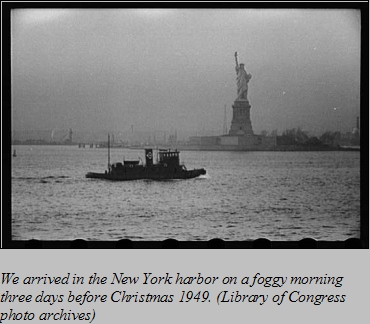
In Wisconsin, a group
of Slovenian farmers agreed to be sponsors, to help refugees resettle in a new
country and start a new life. Our sponsors were John and Mary Brezic, who were
in their sixties and had themselves come to America from Slovenia in 1907
(John) and 1910 (Mary). They created their farm out of a logged over wilderness.
They had one adopted daughter, Helen, who was married when we arrived and was
living on a nearby farm with her husband. Mr. and Mrs. Brezic did not have any
other children, so it was a major change for them to now have a family with a
small child sharing their house. Their 80 acre farm barely supported them, but
they chose to share what little they had. This translation is dedicated to Mr.
and Mrs. Brezic and the good people of Willard, Wisconsin who made it possible
for many Slovenians to start a new life in America.
December 20, 1949
We've been on the U.S. Army Transport
Ship General Greeley for nine days and 3,520 miles. Today we made 402
miles. New York is 758 miles away. If all goes well, only two more days to go!
During the first week on the ship, we were so seasick we thought we would not
live to see America.
December 22, 1949
Many of the passengers got up at 3 or 4
o'clock in the morning. I waited till 5. I put on my best clothes for the first
time since we left land.
At 8 o'clock we saw, in the fog, the
first outlines of dry land: the New Jersey coast. There were many boats and
ships, and hundreds of gulls. I marveled at the unbroken line of cars along the
coast. They were all heading south. Was it a huge funeral procession?
At 9 o'clock we entered the New York
harbor area, and finally at 10 we saw the Statue of Liberty and the Manhattan
skyscrapers. My wife Cilka and son Johnny were with me at the ship's railing. I
had to keep a close eye on Johnny, since
he would wander off and be very friendly with everyone.
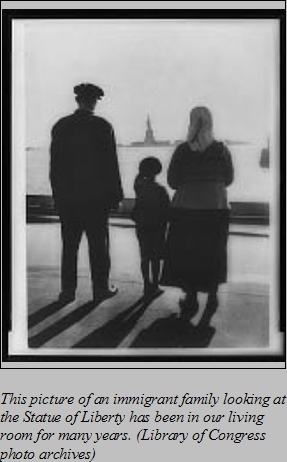
During the last few
days on the ship, we've been hungry and thirsty. We would have been so happy to
get some milk and bread, but they would not give us any. Today, in the New York
harbor, we saw the crew throwing large packages of food overboard.
(Translator's note: Many years
later, I asked my mother how she felt when she saw the Statue of Liberty. She
said it was wonderful. It was a symbol of the freedom that we had been seeking
for so many years. But we were so tired, hungry and thirsty that it didn't
quite have the same feeling as you would expect. And the statue was also a
symbol of how far we had traveled and the fact that we would probably never be
able to go home again. That was very hard for her.)
At 10 o'clock a boat came to the ship
with a customs officer and a number of medical officials. There was no need for
X-rays, they could see right through our stomachs.
In the afternoon, we stepped on dry
land. We didn't stop at Ellis Island - it was just going through
decommissioning. They arranged us in alphabetical order and brought each
person's baggage.
(Translator's note: Our baggage
included two wooden crates which my father had made in the refugee camp. They
measured two feet high by two feet wide and three feet long, and were made from
boards which my father had obtained from a demolished barracks. Inside we had
all our belongings - basically items we had acquired during the past 5 years in
various refugee camps - blankets, clothes, pots and pans my father fashioned
out of the aluminum skin of a downed warplane, and a large quantity of lacework
that my mother had made in the refugee camps. Fifty years later, we still had
the crates and most of the things we had brought in them. The Western Reserve
Historical Society was very happy to accept them as a donation for a possible
future exhibit.)
I was worried I would have to pay customs
duties for the lacework. I talked to a priest about this, and he assured me
that everything would go smoothly. When the customs officer came to us, the
priest sent a pretty young woman to distract him. The customs inspection went
well.
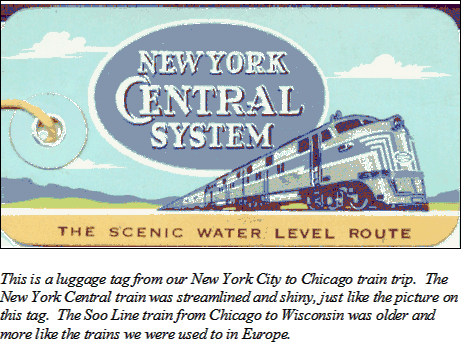 There were some Jews who had larger crates
filled with valuable paintings by well-known artists. They had to open
everything up for the customs officers.
There were some Jews who had larger crates
filled with valuable paintings by well-known artists. They had to open
everything up for the customs officers.
We were greeted by women in grey
uniforms - I think they were the Daughters of the Revolution. They served us
coffee and donuts. I wished they had not taken the holes out of the donuts! If
I hadn't been so embarrassed, I would have gone back in line many times (maybe
I did). Later, we saw a man selling food in many languages - an apple, a piece
of bread and I think small cups of coffee - for a dollar. I bought food for all
three of us and spent as much as I had earned in three days of hard labor in
Austria. At these prices, the few dollars that we received from the National
Catholic Welfare Conference for the trip will be gone too soon.
It was already night when they put us
on busses and drove us through Manhattan to the train station. I looked out
from the bus and tried so hard to see the tops of the skyscrapers that I
developed quite an ache in my neck. I wondered how the driver could distinguish
the stop lights from all the other lights - everything was covered with red,
green and blue lights. (We were not used to Christmas lights.)
We had to wait about an hour at the
train station. I used this time to look for a loaf of bread for about ten
children - ours, Sršen's and Rihtar's. The grownups were hungry, too. But there
were no loaves of bread to be found anywhere - just sandwiches, so thin you
could see through them and expensive as saffron.
A gentleman walked around us a number
of times and looked us over. Finally he came to me and gave me a couple
dollars, and suggested I buy some candy for the children. I was grateful, but I
would have been much happier with a loaf of bread.
Around 11 p.m. we boarded the train. It
was a New York Central train, with large, shiny, new aluminum cars. On the
inside end of each car was a large mirror made of ground glass; stenciled on
the mirror was a map of the railroad's routes all across America. To us, this
train represented the greatness and comfort of America, just as Europe was
represented by the old, small wooden cars that brought us from Salzburg to
southern Italy.
In spite of our hunger, we soon fell
asleep and did not see the first part of our new homeland.
December 23, 1949
With other trains roaring past and many
red and green lights everywhere, I did not sleep well. Sršen's and Rihtar's
children woke before 6, our Johnny at 7:30. From 7 to 8 a.m., the train waited
in Buffalo. There were many factories everywhere. I wondered if they were
automobile factories since there were so many cars everywhere. I wondered about
all the wood houses. They seemed so poor, not like our stone or brick houses
back home. At home, only beggars lived in wood houses. Cars were everywhere,
but no people. I noticed some car cemeteries, too. Snow began to fall,
whitening everything.
In the morning, the train passed
through Cleveland. I'm not sure why this city interested me so much. Maybe
because I had read that this was the second largest Slovenian city in the
world? (Or did I sense that we would someday make Cleveland our home?)
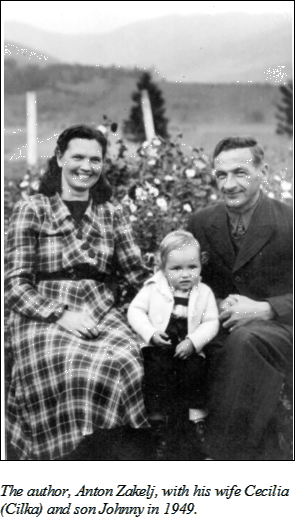 As we traveled through Indiana, we gazed in awe
at the gigantic fields of corn, still unharvested. Next to the fields we saw
tiny houses here and there. We compared it to Croatia.
As we traveled through Indiana, we gazed in awe
at the gigantic fields of corn, still unharvested. Next to the fields we saw
tiny houses here and there. We compared it to Croatia.
Around noon we became hungry, but we
didn't have anything to eat. Sršen and I went to the dining car and asked about
lunch. All they had was tomato soup and sandwiches. An older black man served
us soup and then brought us sandwiches for the kids. Again, everything was so
expensive - soup was 50 cents and a sandwich a dollar.
Four gentlemen were sitting in the same
dining car. They became very loud during their meal; they were discussing labor
issues and not agreeing with each other. When the discussion 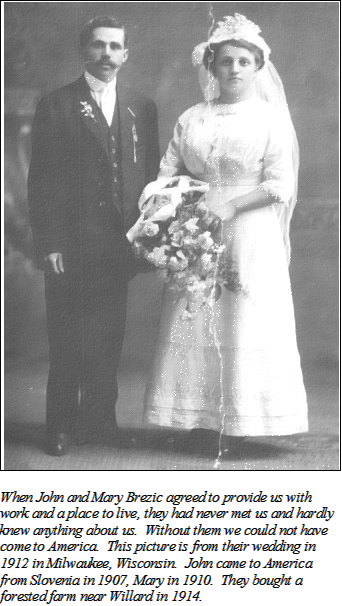 became
especially heated, one of them said, "Let's stop this and sing Silent
Night. It's almost Christmas." And they really did sing it - loudly and
clearly. This is much better than Europe, I thought.
became
especially heated, one of them said, "Let's stop this and sing Silent
Night. It's almost Christmas." And they really did sing it - loudly and
clearly. This is much better than Europe, I thought.
We reached Chicago at 5 p.m. There they
took us to a different train station, where we boarded an old Soo Line train.
After many short stops we reached Marshfield, Wisconsin at 4:30 the next
morning. During the trip our friend Sršen asked every passenger and the
conductor, in Croatian, "When will we get to the station marked on our
envelope?" (In Jugoslavia, we spoke Slovenian, but Serbo-Croatian was the
official language.) After every response, we knew less than we did before,
because none of us understood what anyone was saying.
In Marshfield, people were waiting for
us - Mr. Gosar, Mr. Brezic, Mr. Lamovec, Gosar's brother and others with 4
autos. Brezic recognized me immediately (from a picture I had sent him) and
offered me brandy, but I didn't want any. After an hour's drive, we arrived at
Frank Gosar's farm, where the Sršen and Rihtar families got off, while we
continued on to our new home. When we passed through the town of Loyal, I
particularly noticed the Christmas trees, hanging across the road and covered
with lights - it was as if they were celebrating our arrival.
These Slovenian-Americans talk a
strange mixture of English and Slovenian. For example, all containers are
called "boxa" - from small containers of matches to our baggage to the
biggest wagons and trucks - they're all "boxa".
At Brezic's house, "Lassie"
growled at Johnny when Johnny tried to pet him. Our new "mother"
warned Johnny very strictly, "Leave the dog alone - he's not used to
children." Then she said, "Since you've come two hours late, all the
food has grown cold and I don't have anything to serve you." She was
probably thinking we didn't deserve to be served, since we had probably stopped
at some bar. I remembered the words of the priest in New York who knew Mr. and Mrs.
Brezic: "You will need to be patient; John likes to drink, and 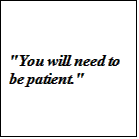 Mary can be pretty finicky."
Mary can be pretty finicky."
Lassie's barking reminded me of the
dreams I had in the refugee camp when we first heard that we had a sponsor in
America. When I learned that there are more cows than people in Wisconsin, I
imagined a mountainous region, since most cows in Slovenia graze in alpine
pastures. In my dreams, I saw a farm high on a mountain. Although the farm was
on a mountain, it was divided by a railroad track: even the buildings were
divided by the track - the house was on one side and the barn on another. When
the train stopped alongside the buildings to unload us, a "Lassie"
came to bark at us. Was it the same "Lassie" who growled at us this
morning?
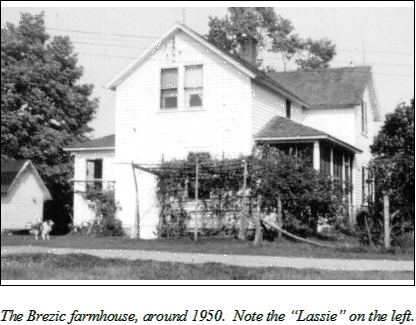 By 7 a.m., we had warmed up and drank some
coffee, and then went to bed. We assured our new landlady that we were not
hungry, just sleepy. Oh, but were we hungry!
By 7 a.m., we had warmed up and drank some
coffee, and then went to bed. We assured our new landlady that we were not
hungry, just sleepy. Oh, but were we hungry!
When we got to our room, Johnny, who
had been sad for weeks, suddenly became so happy and excited that Cilka and I
just laughed at him and cried for joy. At last we all fell asleep and slept
till 11.
December 24, 1949
In Slovenia, a farmhouse is usually
bigger than the barn. Here, the reverse is true. The house seems small, and the
barn is large. I asked our host about that. He said, "You don't get
anything from a house; you earn your living from the barn."
The house is made of wood and laid out
in a "T" shape. The vertical part of the "T" has a porch on
both sides. The porch on one side is used for dirty boots and clothes, but the
porch on the other side does not seem used. The house seems of good
construction and arranged very practically on the inside. On the first floor is
the kitchen, the living room and one bedroom (where the Brezic's sleep); upstairs
is our bedroom and the water tank.
Outside, between the house and the
barn, is a tall windmill which pumps water from a deep well to the house and
barn. The outhouse is far to the back. During the winter, we use a bucket in
the basement, but that needs to be carried out every other day.
On the other side of the farmyard is a shed for 100 chickens and an old log cabin. John and Mary Brezic built the log cabin when they first arrived in 1914. For a number of years, they shared the cabin with two cows, some chickens and a pig. When they could afford it, they built their current house and barn. The log cabin is now used mostly for storage.
Today (the day before Christmas) was
supposed to be a day for fasting, but we had a good home style dinner. After
waiting many weeks, we finally had a satisfying meal.
In the afternoon I rode with John
Brezic and his son-in-law Frank Lamovec the 5 miles to Greenwood to buy spark
plugs for "our" Ford. We stopped at three bars (two Slovenian); at
one, Frank bought me an "egg nog", which I drank for the first time
(and probably the last time) in my life - it was good!
At the shoemaker's we bought rubber
boots for working in the barnyard and the snow (for $4.75). The shoemaker was
also a saddle maker.
John introduced me everywhere:
"This is my new man." He told me to only talk in English, and only
what was essential. He told everyone that I knew "dutch" (not
"deutsch").
At 4 p.m. we returned from Greenwood
pretty loaded. I can't believe that I really drank 3 shots of brandy, 1 glass
of wine and 1 warm Christmas drink. I talked with Slovenians, Croatians,
Americans and Germans, whomever my sponsor John introduced me to, all in their
own languages.
When we were alone, Frank said to me,
"You will not stay here, you are too smart."
After we returned home, I prepared
silage and hay for the animals, and then rode with Helen (Frank's wife) to my
friend Karl Erznoznik's. Karl and his family are living in a farmer's chicken
coop. We were all happy to see each other again after four months. (Karl and
his family had been in the same refugee camp with us.) His two year old
daughter Jolanda no longer recognized me. They are very satisfied - or so they
said. John invited Karl and his family to 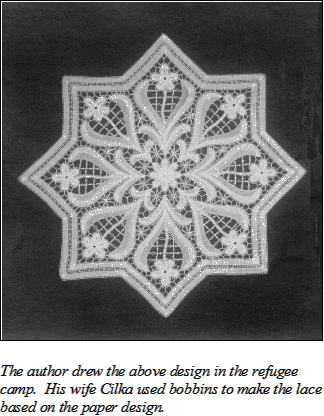 dinner for tomorrow noon.
dinner for tomorrow noon.
At home a good supper waited for us,
then a rosary, and then opening of Christmas gifts. All the Lamovecs came. We
got presents, too! A toy car for Johnny, stockings and a scarf for Cilka, and a
checkered shirt and warm gloves for me. The others each got 5 or more packages
of practical items or toys.
Our sponsors proposed that we call them
"father" and
"mother", but we politely refused, because our own parents are still
alive (and because we didn't know if they deserved such respectful titles.) We
promised that we would call them "Uncle" and "Aunt." I feel
badly that I didn't express our sincere gratitude for sponsoring us and making
it possible for us to come to America when they didn't even know us.
At 11 p.m., Cilka and Mary rode with
the Lamovecs to midnight Mass. John, Johnny and I went to bed.
That night, John said we didn't owe him
anything. He had not had any expenses because of us; he had not even had to
sign the "affidavit" himself. If things don't work out, he said we
could go elsewhere, but he hoped we would stay with them. In the winter, he
couldn't pay us anything, because there wasn't much work; come summer, he would
pay me $50 a month. But later, he said that he thought a person should work for
his sponsor for a year without pay, since a sponsor had to buy additional
equipment or plant more fields to provide work for a new person. I was in
complete agreement with this idea, since I had expected that I would work on a
farm without pay for a year; however, I had also expected that, since we had
nothing, our sponsors would cover at least minor medical care. I noticed that
the "Farmer's Weekly" also said that every farmer who accepts a D.P.
(displaced person) could expect that person to work free for a year.
Weeks later, "Aunt" Mary told
me she had not agreed when John promised Father Odilo that we could come. This
was not right, since she was half owner of the farm. She did not want to be a
sponsor because she was worried I would drink and I would encourage John to
drink when he already drank too much. That's why she watched me closely those
first few days. Unfortunately, on my first day with them, I gave her cause to
worry.
December 25, 1949 - Sunday and
Christmas
"Uncle" woke me at 6 to feed
the livestock. Then we had breakfast - blood sausage, three pieces of bread and
more.
At 8:45 we rode with Uncle to Mass in
Willard. I was surprised by the Slovenian singing in the small, but beautiful
church. After Mass, we exchanged Christmas greetings and talked with people in
front of the church. Then John went to the social hall and bought three cases
of beer (!)
At home I cleaned out the cow manure in
the stable, then at noon the Lamovec and Erznoznik families arrived. After a plentiful
and excellent dinner, they talked and drank beer in the living room till 4.
Then Gosar, Sršen and others came. In the evening, I again helped feed the
livestock and, for the first time ever, milked cows. At seven we had a good
supper, and at 9 we went to bed. John advised me to work in the woods in the
winter and with him in the summer. He said someday I could take over his farm.
December 26, 1949
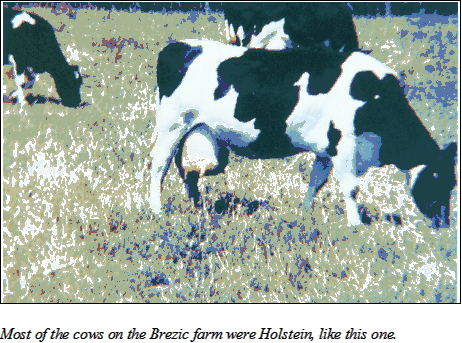 I got up at 5:45 and was in the stable at 6 to
feed and milk the cows. There were 16 cows, but we only milked 10. We used a
Laval electric milker, but we always had to finish milking each cow by hand. I
always washed the udders first with water and Lysol, then I attached the milker
until it was done, moved it on to the next cow, and so on. The daily schedule
was always the same: get up at 5:45, in the stable at 6, breakfast at 7, then
clean the stable and other work; at noon, lunch, then work, back to the stable
to milk the cows again at 4. On Sundays, I would clean the stable after
returning from church.
I got up at 5:45 and was in the stable at 6 to
feed and milk the cows. There were 16 cows, but we only milked 10. We used a
Laval electric milker, but we always had to finish milking each cow by hand. I
always washed the udders first with water and Lysol, then I attached the milker
until it was done, moved it on to the next cow, and so on. The daily schedule
was always the same: get up at 5:45, in the stable at 6, breakfast at 7, then
clean the stable and other work; at noon, lunch, then work, back to the stable
to milk the cows again at 4. On Sundays, I would clean the stable after
returning from church.
A few words about the barn: It's about
150 feet from the house, of very solid construction and quite large. The floor
is cement. Each cow is locked in its stall by a harness made of metal pipes.
The harness is flexible to allow the animal to turn, stand or lie down. Next to
each harness is a watering device: drinking water comes out whenever the cow
presses on the latch.
We use sawdust for bedding. Back home,
people had to haul their logs to the sawmill; here, they bring the saw to the
logs. Whoever needs boards brings their logs into a nearby open area; a person
comes with a tractor-driven circular saw and cuts the logs into boards. That
sawdust is then used for animal bedding.
The barn has a hand-powered system to
move manure outside: a small wagon hangs from a track mounted in the ceiling. I
use a chain to lower the wagon, shovel in the manure, then raise the wagon back
up. Then I pull it on its track out to the manure pile.
Next to the barn is a tall silo that
reaches high above the barn roof. Tall silos are a landmark all across
Wisconsin and rural America. Although they are built of various materials,
including wood, bricks and cement, they all have shiny aluminum cupolas that
reflect sunbeams many miles away. You can tell how large a farm is by the
number of silos. Some have as many as five silos. The Brezic farm has one silo.
The fodder inside our silo is mostly
chopped corn with cobs. The fodder can be thrown through a hole directly into
the stable.
Today, John and I went to church again
and visited with Father Odilo after Mass. I thanked him for helping us come to
America. He told me to work hard and be patient so that, in some years, I could
take over the farm.
At noon, it was just us for lunch and
Lamovec's children - 8-year old Judy and 4- year old Jerry. In the afternoon I
was free for the first time so I could read the newspaper. Cilka wrote to her
mother. The weather outside was beautiful.
December 27, 1949
John advised me to buy an old car from
Stamcar, who was hoping to sell it for $150. He said I had to have a car
"anyhow", if I wanted to stay here. But where could I get the money
for a car? John didn't want to loan it to me. Could we sell that much lace?
December 28, 1949
At 9 a.m. John and I went to
Marshfield, where he bought me overalls ($3.39), a shirt and hat ($1.19).
Marshfield is a beautiful town with many cars and one-story houses. We returned
home at noon. Cilka got a letter from her sister Manica. (We had sent the address
to our families earlier.)
All the people of Willard are extremely
friendly. Everybody asks me, in Slovenian-American, "Kako lajkaš novo
kontro?" (How do you like your new country?) If they see anyone walking,
they invite him to come sit and talk, and then they invite him to a saloon and
buy him a beer. When people asked me how I liked my new country, I usually
replied, "It's nice, but I am not yet here long enough to have an
opinion."
December 29, 1949
John drove to Willard to get feed for
the livestock and to take us to see Father Odilo, but he wasn't in. I received
my first letter from my sister Julka and my mother in Slovenia. They wrote on
December 15. In the evening, Cilka and I showed our sponsors her lacework, but
they didn't show any interest. Of course, cows and lace do not go well
together.
Translator's note: At this point, I
think it's worthwhile to interrupt my father's diary to learn more about the
history of Willard and its people. John and Mary Brezic were among the first
farmers in the area and very much a part of Willard's history. The following is
taken from "Spominska Zgodovina - Historical Memories", a collection
of writings and photographs assembled for Willard's 75th anniversary in 1982.
The following first two paragraphs were written by James M. Cesnik. The next
paragraphs were written by Rev. John Novak and translated by Josephine Trunkel.
The Willard area is - and has been
since the 20th century was in its teen-age years - the largest farming
community of Slovenian-Americans in the United States.
(In 1908,) the area around Willard was
a pocket of raw wilderness. It required the most arduous, bone-wearying toil to
convert it to farmland. It had been cut over by the N.C. Foster Lumber Co. for
its stands of virgin pine and white oak, but was still covered by the stumps
and substantial stands of maple, basswood, birch, ironwood and more. It was
accessible only by foot, horseback, or horse-drawn vehicle across rudimentary
trails or - the best access - via N. C. Foster's Fairchild and Northeastern
Railway.
The first settlers paid $4 to $20 per
acre, which was rather high considering the additional expenses involved before
this land could produce. The brush had to be cut and the roots and stumps dug
out, or pulled with horses and sometimes the large and more stubborn roots were
blasted with dynamite. Then they had to be hand sawed, piled to dry, and
burned.
Not only was this work slow, tedious
and difficult, it was also expensive. Many of these farmers said they would not
go through this work and suffering again, even if the land had been given to
them for free.
Most of the farmers came here with
enough money to pay for the land, but the two years or more before an income
began to return from it were very difficult for them. Besides the cost of
clearing the land, their families had to be fed and clothed. A few had
relatives from whom they could borrow, but most of them had to borrow from
banks and pay a high interest rate.
However, when the fields were cleared
and planted, the soil was very productive. The corn and grain grew tall and
yielded well. The grass in the hayfields and pastures was thick and produced
ideal feed for milk cows, growing calves and work horses.
Slovenian families now (in 1922) number
110, the average owning 40 - 80 acres of land. They are settled in a five mile
radius of Willard. Most of them now have large roomy houses and barns, though
many had started with one room log cabins.
(In addition, the Willard memories book
has the following about John and Mary Brezic:)
John Brezic was born in Austria in 1884
and came to America in 1907, at the age of 23. His wife Mary Marinsek was born
in Austria in 1891 (at that time, all of Slovenia was in Austria). Mary came to
America in 1910, when she was 19. John's first stop was at Meadowlands,
Pennsylvania where he worked in the coal mines. Mary started in Washington,
Pennsylvania, doing housekeeping. From there she went to Milwaukee. In 1912,
John came to Milwaukee and later they were married there.
In 1914 they purchased their forested
farm five miles northeast of Willard. They did their trading and attended
church in Willard, although Greenwood (located to the east) was a half mile
closer.
The farm was woods, brush and stones,
so it took many years to develop, but through hard work and much sweat it
became a modern farm. After purchasing their first few cows, they carried their
milk to the Gemeke corner which was about a half mile. This chore lasted about
a year, then they bought a horse.
The Brezics bought their first Model T
Ford in 1922. Their adopted daughter Helen came into their life in 1923 at the
age of 14 months. She was met at the railroad depot in Owen, Wisconsin with
horse and buggy. They often walked to church which was five miles away.
(And now back to the diary.)
December 30, 1949
We took a saw to Frank and a letter for
my father to the post office. Stamps were 40 cents - they wouldn't take the
international postal coupons I had bought in Austria. Mrs. Oman gave me three
old coats. In the evening we showed some lace to Helen. She marveled at its
beauty and gratefully accepted three pieces as a gift.
December 31, 1949
In the morning, I cleaned the cows,
then the stable. In the evening, we went to confession in Willard. At night it
rained. At 11 p.m. we went to midnight Mass for New Year's and communion.
During this past year, our deepest wishes have come true: we found a new homeland and we became members of a family where we can live without fear of persecution, torture or forceful death. We didn't come here to get rich but to find work to take care of ourselves and to be nobody's burden.
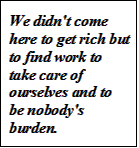 I'm worried about the relationship between our
sponsors. They sometimes do not get along well with each other.
I'm worried about the relationship between our
sponsors. They sometimes do not get along well with each other.
Could I do something to bring them
closer, or am I causing some of their problems? May God give me the grace to
know what to do!
January 1, 1950
A new year began today - hopefully the
beginning of a new life in a new country.
I woke before 6 as usual and went to
the stable. Cilka went to Mass at 11. I tried to sleep, but Johnny cried so
much that neither I nor Mary were able to comfort him. It was warm outside.
In the afternoon, I tried to sleep
again, without success. I felt sick and didn't eat supper.
In the evening, I explained to our
sponsors our predicament during the war. Cilka and I were opposed to communism,
but they drafted us at gunpoint. After we escaped, the communists considered us
to be deserters. When they gained control of the country, we had no choice but
to leave.
It was 10:30 when I finished our story.
I started feeling better, but John fell asleep and Cilka was angry.
According to the Holy Family Parish
annual report for 1949 there are 37 refugees in the Willard area:
1. Dusan Surman, sponsored by Mr. Anton Debevec, Sr.
2. Frank Brodar, sponsored by Mr.Anton Debevec, Jr.
3. Anton Kocjan, sponsored by Mr. Frank Perovsek
4. Alex Metlikovic, sponsored by Mr. Rev. Bernard Ambrozic
5. William Kuntera, sponsored by Mr. Alphonse Volovsek
6. & 7. Jakob and Martina Boznik, sponsored by Mr. Frank Volovsek, Sr.
8, 9 & 10. Karl, Marija and Jolanda Erznoznik, sponsored by Mr. Frank Volovsek, Sr.
11. Anton Asl, sponsored by Mrs. Mary Snedic
12, 13 & 14. Ivan, Branimira and Marija Berlec, sponsored by Mr. Ivan Ruzich
15, 16 & 17. Anton, Cecilija and Janez Zakelj, sponsored by Mr. John Brezic
18, 19, 20, 21 and 22. Miha, Katarina, Anton, Marijanca and Katarina Srsen, sponsored by Mr. Frank Artac
23, 24, 25, 26, 27, 28, 29, 30 and 31. Franc, Kristina, Franc, Milan, Janez, Miha, Marija, Pavla and Marija Rihtar, sponsored by Mr. John Kutzler
32. Janez Mrzlikar, sponsored by Rev. John Novak
33 and 34. Marija and Joze Androjna, sponsored by Mrs. Justina Volarich
35, 36 and 37. Marija, Stanka and
France Brecelj, sponsored by Mr. Anton Debevec, Sr.
January 2, 1950
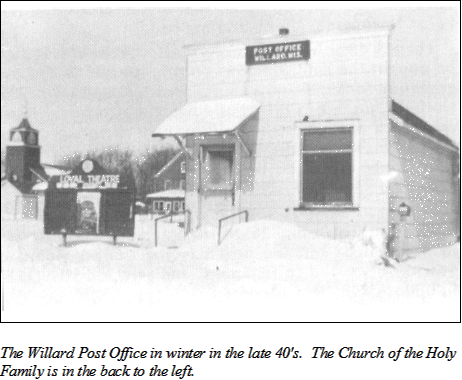 The snow disappeared and in the evening it
started to rain. John and I worked on the water tank.
The snow disappeared and in the evening it
started to rain. John and I worked on the water tank.
John went to cook brandy from dry plums
and sugar, which he had bought in Marshfield on Dec. 28. John knew how to make
his brandy so it would look just like the commercial kind. He roasted powdered
sugar in a skillet until it became golden brown; then he shook that into the
bottles to make the brandy look just right.
January 3, 1950
John wanted to buy me Stamcar's 17 year
old car for $150, but I wasn't able to promise repayment and "Aunt
Mary" was against it: "You can buy an old car anytime you want,"
she said.
Eight cm. of snow fell today.
January 4, 1950
In the morning I froze part of my left
ear when I was hauling manure outside. There was a strong, cutting wind. In the
afternoon, we went to Karl's and to the post office.
In the post office I wondered about the
pictures of black men on the wall, with the large word WANTED under each
picture. What had they done to be so desired?
There are no black people in Willard.
All of us new arrivals refer to Africans as black people. The local people
laugh at us when we say that. The locals refer to them as coloreds or niggers.
There is one Indian family in Willard.
They live in a wooden hut outside of town. I've been told 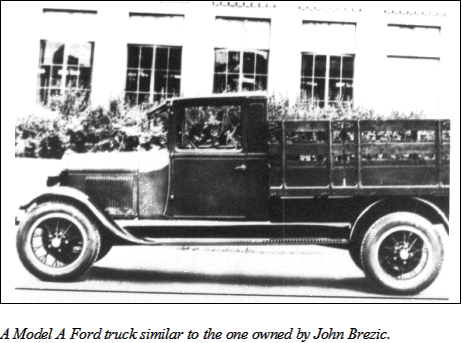 that about half of the family died of
tuberculosis some years ago. They have a son who is a priest who is also sick. Farmers
hire other members of the family at harvest time. I have heard that they work
for beer, but people are not allowed to give alcohol to Indians.
that about half of the family died of
tuberculosis some years ago. They have a son who is a priest who is also sick. Farmers
hire other members of the family at harvest time. I have heard that they work
for beer, but people are not allowed to give alcohol to Indians.
January 5, 1950
It was -20F in the morning, 10 above in
the afternoon. In the evening I wrote to Mire, Cene, Vinko, and Frank in Canada
and to Paul in New York.
January 6, 1950
Today is the feast of the Three Holy
Kings, but there is no holiday on the farm. The temperature is again -20F in
the morning and 10F in the afternoon, 0F in the evening. I wrote to Jernej
Zupan and Jernej Kopac. All together I finished 7 letters.
January 8, 1950
Johnny has a cold and probably getting
a new tooth again. At 8:30 I went to Mass, then cleaned the stable. Mr.
Podobnik, who was in Goricia as an American soldier, came to fix the well. He
told me how he was arrested in Jugoslavia when he crossed the border.
Mr. Zagozen, the auto dealer from
Greenwood came offering Stamcar's car for $125. John thinks I should buy it. It
has only 24,000 miles on it, since no one used it after their father died. Our
Model A Ford truck has 72,000 miles - it's the tallest and the dirtiest vehicle
in the line in front of the church, but John won't let anyone wash it. Today,
"Aunt" Mary is not opposed to my buying the car either, but I don't
have any money and I don't know when I'll earn any. John already told me that
he can't pay me anything now when there isn't any work, but he'll give me $50 a
month in the summer.
Karl invited me to his place for
dinner. John turned down his request to borrow the brandy cooker. Aunt won't
allow it.
In the morning it was +6F, then +45F
and windy.
January 9, 1950
In the afternoon, Karl's wife Mici and
their daughter Jolanda visited us and invited us to come visit on Sunday. The
post office sent me a letter and 20 cents, since I had paid them too much on
Jan. 7 (they had finally accepted my international postal coupons). I helped
John balance his checkbook. The weather was warm.
In the evening, John, Frank (his
son-in-law), Mary and I went to Loyal to watch the film "Lion".
January 10, 1950
A snowstorm today. We were unable to go into the woods to get firewood for the church.
Mr. Zagozen came again to sell
Stamcar's car. In the afternoon, John and I went to Greenwood to fix the Ford.
I sold 6 pieces of lace for $14.50, which means we made 10 cents an hour for
the labor and nothing for the materials. I promised to buy the car if I could
sell enough lace. Mrs. Zagozen and another woman agreed to come look at our
lacework.
January 12, 1950
At 9 a.m. John and I went to the
location of a future resort, where they were cutting firewood for the church.
About 20 men came, all with their own cars. They cut the trees with power saws
and tractor-driven circular saws. At noon I chipped a tooth eating dried meat.
January 14, 1950
Snowdrifts blocked the roads and made
them impassable. The mail didn't come. Frank was going to come slaughter a cow,
but he didn't make it either.
January 15, 1950, Sunday
No one went to Mass today. It's 5 miles
to Willard in one direction and 5 miles to Greenwood in the other direction -
too far in this kind of weather. John and I fixed the tracks that help run the
manure wagon out from the stable.
Earlier, I wrote to Karl, telling him
we would come visit today, but now we can't. Even so, later in the day, I rode
with John to Greenwood to see Mr. Ford for help with the income tax forms. Mr.
Ford showed us his ten-year project - a miniature railroad with 5 - 7 tracks and
as many trains - all electric.
January 16, 1950
Johnny is getting his second eyetooth.
January 17, 1950
My father (back in Slovenia) is 71
years old today. We had chicken and other good food today - I wonder what he
had? In his first letter to me in America, he wrote that he would be very
grateful for some flour, if we have any extra. Unfortunately, I am not able to
help him.
January 19, 1950
I spent all morning cleaning the
stable. I felt tired, angry and unappreciated.
In the afternoon I split enough wood to
heat the house for two days, like I did every day. It was not good firewood
(aspen and birch), so we needed a lot for our four stoves (in the kitchen, the
living room, the basement and chicken coop).
Helen brought Mici to visit.
January 20, 1950
We received our "Identification
Cards." In the afternoon we visited Father Odilo. He advised me to stay as
a hired man at Brezic's, so I could someday take over the farm. Father Odilo
said the country is heading towards another Depression and terrible
unemployment. At the post office, I exchanged 4 English, 10 Austrian, and 13
American postal coupons for $1.35 and, later, an additional 10 cents.
January 21, 1950
In the morning I washed the cows.
Again, I felt tired and dirty. In the afternoon I made a new part for the
horse-drawn wagon since the old one was broken. I also worked on new handles
for the ax, the pick and other tools. John doesn't have woodworking tools and
isn't interested in woodworking.
January 22, 1950, Sunday
At 9 a.m. I went to Mass, then John and
Mary went at 10:30. After Mass I went to visit Karl. His sponsors let him live
in an empty chicken coop. They let him clean it and paint it. They 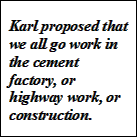 give him a quart of milk a day for helping with
the livestock feeding and milking. This is hardly enough to support his family
of three. We stayed for dinner (soup, potatoes, fried chicken, lettuce, apples
and pastry.) At 1, Mr. Rihtar and Mr. Sršen also came to visit. Karl proposed
that we all go work in the cement factory, or highway work, or construction.
give him a quart of milk a day for helping with
the livestock feeding and milking. This is hardly enough to support his family
of three. We stayed for dinner (soup, potatoes, fried chicken, lettuce, apples
and pastry.) At 1, Mr. Rihtar and Mr. Sršen also came to visit. Karl proposed
that we all go work in the cement factory, or highway work, or construction.
I will stay at Brezic's, even though I
know I won't earn much: I'm interested in farming and I owe my sponsors thanks
for helping my immigration. Karl hopes he will earn 80 - 90 cents an hour and
work 10 hours a day 9 months a year. The cement factory would provide housing,
too. He doesn't want to stay at his sponsor's because he doesn't like working
in the barn. Rihtar hopes he'll start building houses, and he'll need workers.
Mici showed us many clothes that good
people had given her for free. Sršen said people actually bring him too much
meat. At 4 p.m. John and Frank came to get us; after 5 hours of visiting it was
time to go.
January 23, 1950
The temperature was about +25F. Frank
Lamovec came to slaughter a cow this morning. In the afternoon, John took the
meat to the locker in Greenwood. They threw the hide in the snow for the foxes
and gave most of the fat to the cats. At Cilka's urging, they saved at least a
little of the fat to make soap. In the evening we cut up part of the backbone
for meals at home.
John promised he would pay me something
for my work on the farm, after I told him about my conversation with Karl and
Rihtar.
January 24, 1950
A snowstorm today. In the morning, John
and I tried to get to the barber in Greenwood, but we had to turn back after
half a kilometer. There were impassable drifts on the road.
January 25, 1950
Heavy snow. I cleaned the chicken coop.
January 27, 1950
In the afternoon in Greenwood, I dropped
off a letter at the post office for Milo Huber and went to the barber for my
first haircut in America. Haircuts cost 60 cents. In the Farmers' Store, they
promised to buy some lace.
January 28, 1950
In the afternoon John and I took the
horses into the woods to get firewood. The horses were strong, but they still
had to strain to pull the heavy wagon!
A man came in the evening and invited
me to go work with him in the woods. He would pay me $50 and necessities for
one month of hard labor. My wife could help in the kitchen to earn food for
herself and my son. How could I work in the woods in this kind of weather, with
the clothes I have ? I would freeze. (Later I learned that he had also invited
others - unsuccessfully, and that his workers are fed poorly and they have to
do additional saw work at the house after they return from the woods.)
When he left the room, I said to John,
"If I have to be a slave somewhere, I'd rather do it with you than with
someone I don't know and to whom I don't owe anything." But quietly to
myself, I wished God would give America another Lincoln.
January 29, 1950
Stormy. At 9:30 the others went to
church: John, Mary and Cilka. Johnny and I stayed home. Our old Model A is a
small truck; there's room in the cab for two, maybe three people at the most;
if anyone else comes along, they have to sit in the open wind in the back.
January 30, 1950
In the evening, John, Mary and Cilka
went to the wake for Mrs. Gosar's father. In the morning it was -38F: ideal for
splitting wood. You just let the axe fall onto the wood and the wood explodes,
because it's frozen. But I had to warm myself up inside the house first by
exercising so I would not freeze outside.
The silage was frozen up to a foot in
from the silo walls. It had to be crushed and spread in the stable to thaw out
and dry. Wet silage is dangerous for animals.
January 31, 1950
I went to the wake with John in the
evening from 8 to 11.
February 1, 1950
At 10 a.m. we went to the funeral for
Mrs. Gosar's father. John and I came back at 2. They had to use explosives to
dig the deeply frozen ground for the grave.
February 2, 1950
At 9 everyone except Cilka went to
church. In the afternoon I fixed the broken flooring for the horses.
February 3, 1950
Nice weather. For the first time,
"Aunt" Mary cooked "štruklje" at my request. They were very
good, with eggs and butter, but John didn't eat any. "I don't feel
good," he said.
During our first weeks on the farm,
Cilka often brought me a piece of bread when I was working in the barn or the
chicken coop. (I had set up a workshop in the chicken coop.) When
"Aunt" became convinced that I didn't drink, she said, "Tony,
since you don't drink, you can take milk, bread, oranges or apples from the
icebox whenever you want!" I gratefully took advantage of her offer -
whenever I was really hungry.
In the afternoon John and I went to
Greenwood. I sold $5.65 worth of lace at the Farmers' Store. When will I have
enough for a car?
February 4, 1950
At 11, I went to Neillsville for the
first time. At the courthouse they told me what I had to do to get my
"first citizenship paper". An old clerk named Frantz knew less than I
did. I think he filled out the wrong form. At the farmers' store I wasn't able
to sell a single piece of lace.
February 5, 1950
Nice weather. At 10:30 we went to
church, then from 1 to 3 at Stamcar's. They have 48 head of cattle, many pieces
of equipment and plenty of everything. They are the sponsors for Paula Rihtar,
but she isn't happy. Mrs. Štancar said "It isn't anything hard! Nothing
more than serving two boys; I don't know what's wrong." They served us
candy, beer, brandy, klobasa, bread, potica and coffee.
In the evening our sponsors went to
play cards and we went to bed. Our sponsors played cards at home sometimes, but
they would tell me, "You take care of your child, since you don't know how
to play cards." Johnny usually played by himself and I read. When I
interrupted his playing once, he said, "Don't bother me!" Where did
he learn to talk like that?
February 6, 1950
"Uncle" sold a three-week old
calf at 20 cents a pound for 97 pounds. Then we immediately got a new one. What
a fortunate birth! In the afternoon we hauled a wagonload of wood from the
woods.
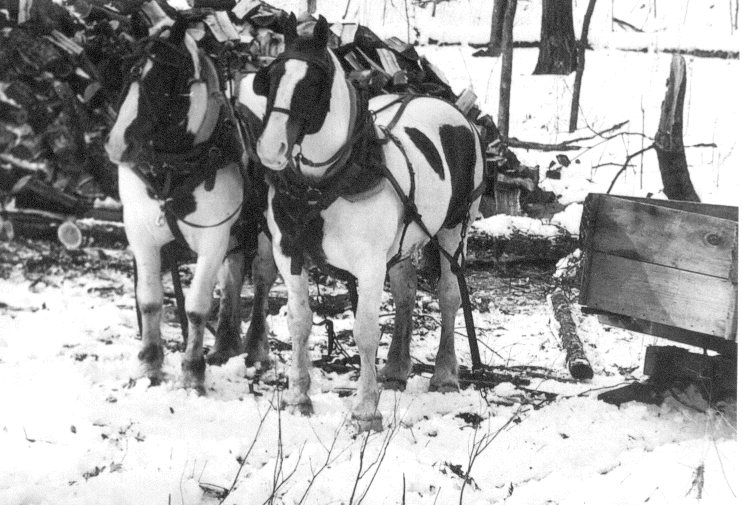 February 7, 1950
February 7, 1950
In the morning we hauled in three wagonloads of wood, and in the afternoon we hauled the first of four large birch trees. Tiring work!
February 8, 1950
I fixed the manger for the horses.
Back in Slovenia, life must be harder
than it was in America during the Depression. "Aunt" Mary received a
letter from a relative, begging her for a bag of white flour. "Uncle"
did not agree, so Mary did not send the flour.
We have received other kinds of requests from Slovenia as well. "Uncle" received a letter from a relative, a young girl, who asked him to send her a pair of eyeglasses with golden frames. I advised him to ask her to send him
a prescription written by an
optometrist. He did, and the young lady responded, "No prescription is
necessary. The quality of the lenses is not important; the only important thing
is the golden frame." "Uncle" did not fill that request either.
February 9, 1950
Split wood.
February 10, 1950
I made a new floor by the door and new
"bridges" (across the manure ditch) for three cows. Another calf
born.
February 11, 1950
I cleaned the cows from 10 till 4. John
told me he had an argument with his wife.
February 12, 1950
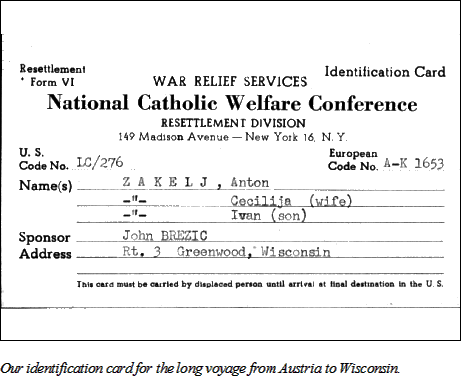 At 8:15 Cilka and Johnny went to church. Mary
told me about her argument with John. She wants us to stay because we're a good
influence on her husband. He's been more peaceful and sober since we arrived.
At 8:15 Cilka and Johnny went to church. Mary
told me about her argument with John. She wants us to stay because we're a good
influence on her husband. He's been more peaceful and sober since we arrived.
Will we be able to live together? I am
having doubts about that. John never seems satisfied with my work. I can milk
the way he tells me today, but tomorrow he'll want it done differently.
Sometimes I'm feeling hopeless.
"Aunt" noticed this right away and asked John, "What was the
problem with you and Tony, why is he so sad?" John didn't answer.
February 13, 1950
I received a bill from the National
Catholic Welfare Conference for the train fare from New York to Marshfield -
$101.32. Where will I get that?
February 17, 1950
The first half of February was nice and
warm. around +20F in the morning and +40 to 50F in the afternoon.
February 18, 1950
At night cow number 9 gave birth to a
healthy calf. Since John's been cooking brandy, I have to feed and milk the
cows myself. John and Mary drove to Greenwood this morning and didn't return
till 1 because of the snowed in roads. "Aunt" Mary bought Johnny a
shirt, underwear and pants. For Cilka she bought cloth for a dress and apron.
February 19, 1950
+20F in the morning, +40F in the
afternoon. We all rode together to church. After church we went to Lamovec's
for dinner, which was like a wedding banquet. After dinner we went to Karl's
and brought him back with us. Everybody except me played cards; I read till
3:30. After a snack, Helen took Karl back home.
February 21, 1950
I cleaned the manger in the morning,
then split wood. It's Mardi Gras, so we had pastry and fancier bread this
morning. The Lamovec family came to visit in the evening. While the others
played "crazy" and pinochle, I played "old maid" with Judy
and Jerry (Lamovec's kids.) Although I was sleepy, I felt I had to keep the
children company till 11:30. Not a happy Mardi Gras!
February 22, 1950
Cilka woke me at 6 - John was already
milking, but he wasn't mad that I was late.
February 23, 1950
A light snow fell; colder.
February 24, 1950
-25F. Even though it was storming, I
went out and split wood. The colder it is, the better the wood splits.
February 25, 1950
-22F. I fixed a wheelbarrow and cleaned
the cows in the morning. In the afternoon I read till 2, then I split wood.
John is drinking less and is friendlier to his wife and to me, and is not
smoking.
February 26, 1950
I woke up at 5:20 and started milking at
5:30. John came later. He and Mary went to church at 8, then we went at 10.
Mary stayed with Helen, who is sick. Father Odilo Hajnšek said his farewells;
he's going to Lemont. We're very sad about that! He did a lot of good things
for us. Today, on the first Sunday in Lent, he called on the farmers to not let
the refugees suffer, to serve them the same food as they serve their own
families. Now we'll get a new priest, Father Augustin Svete, who probably will
not understand us.
Sršen and Rihtar came with their kids in the afternoon - they're the only people around here who get around on foot. They stayed till 4:30. Cilka treated them to gingerbread, which they ate a lot of.
In the evening, John drove to a card
party in the church hall, while I wrote and kept watch on a cow who was due to
calve. I watched till 10:30, but no calf.
February 27, 1950
John woke me at 2 in the morning, to
come help him in the barn. At 3, cow number 4 gave birth to a white calf. I
didn't go back to sleep. In the morning, I kept watch on number 5, who gave
birth at 11 with some difficulty. The calf barely stayed alive.
After a birth, we wash each cow with
Lysol and water. In the afternoon I split wood to stay awake.
February 28, 1950
This morning we took a calf to Volovšek's.
John received $25 for the 110 pound calf. At the same time, we bought a 200 lb.
pig.
The Volovšek farm has separate little
huts for each pig, spread out across the farmyard. In front of each hut is a
long wooden trough made from hollowed out tree trunks. The troughs have
corncobs and warm dishwater in them. Today, the pigs were running freely around
the farmyard. John chose a pig and tried to lasso him, but the pig took refuge
in his hut. John went into the hut after him, but the pig ran out. Somehow John
finally caught the pig and got him into a pigpen, which we then hoisted onto
the truck. The pig weighed about 200 pounds and cost $35.
On the way back, our truck slipped into
a ditch and barely stayed upright. Kranjc's tractor and four men pulled it out.
In spite of the strong wind and blowing
snow we came home safely. After we arrived back home, we had an argument about
cleaning the parking area.
In the evening there was a farewell for
Father Odilo, but I didn't go.
March 1, 1950
0F and it feels colder with the wind.
Aunt said she likes me and she hopes we
will stay. She is willing to do whatever she can to help us stay. She asked me
to just tell her what I would like to eat and she'll cook it for me. John is drinking
less now and is easier to get along with.
March 2, 1950
The mail didn't come today due to high
snowdrifts.
March 3, 1950
I used the woodworking tools to make a
new part for the wagon.
March 4, 1950
The weather has changed from the south;
it's become warmer.
March 5, 1950, Sunday
I woke at 3 a.m. and didn't go back to
sleep. At 5:30 I went to the barn and worked for two hours. John is criticizing
me more and more often when I am not at fault. I ate a little cornflakes for
breakfast and went back to the barn. At 8 the others drove to church while
Johnny and I stayed home. We went in the barn, where I cleaned and brought
silage from the silo. At 10 John drove me and Johnny to church.
In the afternoon Mrs. Stamcar and her
son Tony came to visit. Cilka, Johnny and I went to our room upstairs. It's
+36F outside and the snow is melting fast.
At 3:30 Stamcars left and Frank Lamovec
arrived. He called to us to come down, but I was writing a letter to my sister
Mici and brother Joseph in Slovenia.
Frank and I had an argument a few days
ago. He said that Bishop Rozman personally executed many thousands of people. I
was very angry to hear him repeating such lies and I corrected him. Bishop
Rozman was a hero to the people who fought against the communists in Slovenia.
Helen chided Frank and said "Tony knows what really happened - he was
there."
Someone has been spreading lies about
Bishop Rozman and all of us refugees - saying that we collaborated with the
Germans. Many Americans believe those lies. In the long winter evenings, I
often talk with John and Mary about all the suffering caused by the communists
and how we had all fought the Germans. John always listens without much
interest, and then he says, "And did you have to flee because you
supported Hitler?" It doesn't help when I explain to him that I was in
danger from both the Germans and the communists. In fact, the Germans held me
hostage and threatened to kill me.
When John accuses me of supporting
Hitler, Mary looks at him angrily and says "John, you're crazy!" She
has a brother who is a priest in Rome and who writes to her often. He provides
her with a better understanding of what happened during the war.
Later this evening, John tried to take
back the angry words he had said to me that morning. I kept quiet. I can see I 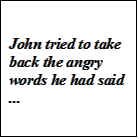 just can't work with him. I would take another
job immediately if I only could.
just can't work with him. I would take another
job immediately if I only could.
March 6, 1950
At every opportunity John tells me he
is sorry. He says we can live and work together nicely, since we think alike. I
only reply "Yes, in some areas."
March 7, 1950
Our sponsors had a very serious
argument at breakfast. Mary is angry that John offended me. She's threatening a
separation.
John promised I would be paid from now
on if we would stay. I told him that I still didn't know what we would do. If
we can get along, I'd like to stay, but never if we'll continue arguing.
"I'd rather starve than live in a constant dispute." I told him that
we would both have to be patient and let some things go quietly, including him,
not just Mary.
I wrote to Jernej Zupan in Cleveland
and sent him lace worth 58.70 shillings for books from Mohorjevo publishing. I
asked him to find a job for me.
John and I went to Willard in the
morning. In the afternoon we had a downpour and water in the barn. I cleaned
out the water and spread sawdust on the floor.
John is scrupulous about cleanliness in
the barn: there is always a pile of lime next to the door. Anyone who wants to
step into the stable area has to wipe his shoes in the lime first. "Lime
kills germs", John says. I often have to spread this pile of lime across
the entire length of the stable and then sweep it back into a pile.
March 8, 1950
John said he'd rather just leave now
than have another argument with Mary.
March 9, 1950
Milica Zonta wrote from Neelyville,
Missouri. She and Rafko are in the same situation we are: lots of work and no
pay.
John became sick yesterday. Mary and I
are milking the cows.
Today I split wood for four hours.
March 10, 1950
John has a stomach ache and the flu.
John advised me to write to Rev. Wolfe,
the pastor in Bangor regarding the bill for the train fare from New York to
Wisconsin. He gave me a check for $50 (to send in) and suggested I ask for a
delay or reduction on the remaining $51.32.
This Monday we started using two
milking machines to milk 13 cows. Milking takes about an hour. When we used one
miler, we milked fewer cows. When we've filled 5 big cans (about 200 liters),
I'm soaked with sweat, even with the help of the milking machines.
March 11, 1950
John went to see the doctor in
Greenwood. Dr. Olsen told him that he was sick because he's holding his anger
inside and not letting it out like he usually does.
Rihtar and Sršen went with John to get
letters brought by Milica from Austria. They are also working without pay at
their sponsor's farm.
John felt better after he came back
from the doctor. Now Mary is starting to feel sick.
March 12, 1950
Mary stayed in bed. Johnny is sick,
too. John and I went to church, but we got there late because we tried -
unsuccessfully - to help Helen get her car out of the snow on the way there.
Lamovec's came to dinner.
In the afternoon, Frank took me and Helen
to Greenwood. Helen went to ask the doctor about Mary, while Frank took me to
see a bar and bowling alley and drink beer. We returned home at 1:30, and then
Frank took me to the northwest across a hill to a Slovenian restaurant, which
was modern but in the middle of nowhere. They had an automatic record player
with 20 records.
People at the restaurant talked about an old man who died recently. He worked as a farmhand all his life. His master gave him his daily bread and a bed with the animals in the stable, but never a penny. People were upset about this and criticized the farmer. The farmer promised to buy the man a tombstone. Is the same destiny waiting for me?
At 3:30 we returned. From 3:30 to 7:30,
I worked in the barn as usual. Frank promised to teach me to operate a tractor.
He is becoming quite friendly.
March 13, 1950
"Aunt" Mary and Johnny are
healthy again.
Instead of a tractor, the Brezic's have
two strong horses. All winter they only went out a few times to haul wood or to
smooth the road. They were inside so much they grew very long hooves. John had
to set the hooves on a chopping block and cut them back with an axe.
One of the horses likes to kick and
bite. If anyone gets close to him without warning, he immediately kicks. Once I
was working at the other end of the barn when I heard a horse neighing at the
end by the doors. I looked and saw little Johnny next to the horse. I called
out to him and told him to stay completely still. I ran over, patted the horse
gently and pulled Johnny away. It's a mystery to me how a year and a half-old
boy could have opened the heavy barn door and come in by the horses.
March 14, 1950
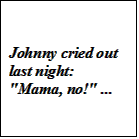 Johnny cried out last night: "Mama,
no!" Helen drove to the doctor and asked about Cilka, who is now two and a
half months pregnant and is bleeding. The doctor said Cilka needed to go to the
hospital immediately. At 12:30 in the afternoon, Helen took her to Marshfield.
Helen came back at 9 in the evening. She said Cilka was operated on
immediately. Cilka feels better, but she's lost the baby.
Johnny cried out last night: "Mama,
no!" Helen drove to the doctor and asked about Cilka, who is now two and a
half months pregnant and is bleeding. The doctor said Cilka needed to go to the
hospital immediately. At 12:30 in the afternoon, Helen took her to Marshfield.
Helen came back at 9 in the evening. She said Cilka was operated on
immediately. Cilka feels better, but she's lost the baby.
It's been many years since I've cried
as much as I did today; my head hurts from the crying.
March 15, 1950
I slept poorly. John woke me at 5 and
told me I could stay in bed; he said he would feed and milk the cows. I woke at
6, heated some coffee and fried some eggs. At 7:30 John came to clean the sink
and I went to clean the stable. Mary came back from Lamovec's, where she had
stayed the night. Around 11, Helen drove me to Marshfield. Cilka is feeling
well and will come home tomorrow. Mary sent oranges for her, Helen bought her
chocolate, candy and a comb. We stayed in the hospital till 3 p.m.
It's only now, when Cilka's sick, that
I realize how much I love her. What would I do by myself? A slave on a farm
till I die! And our Johnny will be a slave, too. I will want to send him to
schools, so he won't have to suffer like I have, but I won't have the money to
pay for his schooling.
Helen, Frank, John and Mary all tried
to comfort me. They said Cilka was not in danger and would be home soon,
completely healthy. But I kept thinking about the worst things that could
happen. I went to the barn and cried.
March 16, 1950
Helen went to Marshfield in the morning
to get Cilka. She brought her home at 3:30 p.m. The bill for two days in the
hospital was $29.25, but they reduced that to $20.95. In addition, the
operation was $50, anesthesia $10 and John paid Helen $15 for transporting us;
therefore, $95.95 total, or two months of work on the farm.
March 18, 1950
Warm. I worked in the barn in the
morning. John and I went to church for confession in the afternoon.
March 19, 1950, Sunday
I got all my work done in the barn by
7:30, then went to church with John and Mary. More than 100 men received Holy
Communion, as members of the Holy Family Society.
After Mass, we had breakfast in the
church hall: coffee, potica, donuts, cookies, sausage, meat (both pork and
chicken) and more. Those who could afford it, paid; others who could not, ate
for free - just like in the early years of the Christians!
The women's society members brought
homemade potica and cakes to be sold for the society. If a piece didn't attract
a buyer, the woman who made it bought it herself to prevent embarrassment.
In the afternoon we had visitors:
Ludvik Artac and his parents, then Malci Jeras with two kids and Karl with his
family, then the Lamovec family and finally Sršen's. Sršen and Karl want to
find work elsewhere as soon as possible, preferably together. Sršen asked me to
help him answer an ad for work at a Shoe Service. He gave me 20 cents for
helping him, the first two dimes I earned in America.
March 21, 1950
It's the first day of spring, but it
snowed all day. Yesterday I moved 100 bushels of oats and 12 sacks of
fertilizer. Today I split wood. John is usually milking by himself. Since I
never seem to do things right as far as he's concerned, I try to not work with
him. I am becoming more ill-humored, quiet and withdrawn. This can't go on much
longer.
March 22, 1950
About 5 - 6 inches of wet new snow fell
today. In the morning, I went to Greenwood with John to buy leather, but the
shoemaker only had pieces of horse leather that were about 30 inches square. On
the way back, we saw Sršen, who said that Rihtar got a job in Cleveland as a
carpenter at $3 an hour. He will go to Cleveland this Saturday.
March 23, 1950
I wrote the Marshfield Clinic and asked
them to reduce the bill for Cilka's operation.
Lamovec brought 25 sacks of potatoes
from Stevens Point. They cost $10, or less than a penny a pound. Since the
potato harvest was plentiful last year, they are selling potatoes for animal
feed, with government support.
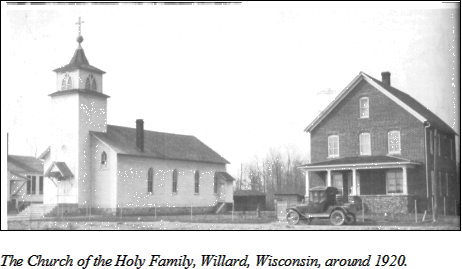 In the evening, Mrs. Rakovec visited with her
son Ciril and his wife and daughter. Ciril made a very positive impression on
me. Although we had not met before, he suggested that we each get a week's
vacation this summer: when one goes on vacation, the other takes care of his
chores. Ciril knows John well. He worked for him as a hired man for a few
months and understands that he's impossible to work with. If we were staying
here, I would become best friends with Ciril. But since I hope to move
elsewhere before too long, I kept quiet and went to bed at 9:30, while the
others talked till 11. (+60F)
In the evening, Mrs. Rakovec visited with her
son Ciril and his wife and daughter. Ciril made a very positive impression on
me. Although we had not met before, he suggested that we each get a week's
vacation this summer: when one goes on vacation, the other takes care of his
chores. Ciril knows John well. He worked for him as a hired man for a few
months and understands that he's impossible to work with. If we were staying
here, I would become best friends with Ciril. But since I hope to move
elsewhere before too long, I kept quiet and went to bed at 9:30, while the
others talked till 11. (+60F)
March 24, 1950
John went to Marshfield with Frank, but
they weren't able to get the right kind of leather there, either. I worked on
the bull's stall. It's a waste to have a bull for 16 cows; the bull and the two
horses eat more feed than 4 cows, and don't provide any benefit. It would be
cheaper if, instead of the bull, we used artificial insemination, and instead
of the horses, asked Frank to help with his tractor.
After three months in America, we have
nothing and are $200 in debt.
March 25, 1950
I cleaned the cows in the morning. The
Marshfield Clinic responded to my letter; the bill for Cilka has been reduced
from $85 to $60, but this must be paid immediately.
March 26, 1950, Sunday
At 10 o'clock, we went to church. On
the way to church, we got stuck in deep snow and mud. When I was pushing the
truck to get it unstuck, John stepped on the gas and sent mud flying all over
me. I had to go back and change clothes.
The roads here are hopeless, like
nowhere in Europe. They're just sand, pushed in from each side. When melting
snow soaks the sand, cars swim in mud up to their axles. When the ruts on the
nearby road get too deep, John sometimes goes out to level the road. He uses
his team of horses hitched to a kind of harrow made of six 8-foot long tree
trunks bound together with chains. Of course, this lasts only for a couple
cars.
After Mass, John took Karl back to his
home. Sršen and I decided to look for work in Marshfield, maybe in the shoe
factory.
In the afternoon and evening, I wrote
to my brother John and my mother in Slovenia, and to Jesenko's in Cleveland.
Outside, it was windy, rainy and muddy.
March 27, 1950
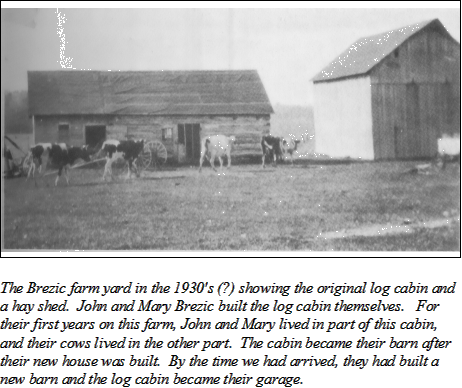 John woke me at 5 a.m. to help with the birth of
a calf which was already 10 days overdue.
John woke me at 5 a.m. to help with the birth of
a calf which was already 10 days overdue.
In the afternoon, I cleaned the area
around the well. The farm has a windmill which pumps water and sends it to the
kitchen and the stable. Large sheet metal water tanks are located all around
the farmstead.
Helen and Cilka worked on a quilt they
are making from 1,000 pieces of cloth. While they sewed, Mary talked about how
it was when they first bought their land around 1910. There were no roads
nearby. Mary and John bought 80 acres that had never been farmed - the big
pines had been logged off earlier, so when they got the land, it was mostly
brush and aspen. They built a log cabin, really more like a shed. Although
there were a number of other Slovenian families that also bought land in the
general area, there were no other houses nearby. After John and Mary bought
their first cow, the cow slept in the cabin with them.
Mary said life was alright in the
summers in those early years. But, during the winters, John would go work in
Chicago because they needed the income. She was alone all winter in that little
cabin. She didn't have horses or a car, so she had no way to travel anywhere.
On rare occasions, the neighbor came to visit; or even less often, John would
come visit from Chicago. He would take the train to Marshfield and walk from
there to the cabin, which was almost 20 miles away. There were no busses.
Mary said there was a stranger that
came to her cabin one winter's day. He was either lost or on a long trip. She
was very afraid of him, but she fed him supper and let him stay overnight. The
next day he moved on and she never heard from him again.
Over the years, John and Mary gradually
cleared more land for farming. They planted potatoes. Things got better and
better. They built a nicer house and converted the log cabin into a barn.
March 28, 1950
Sršen and Karl went to Marshfield to
look for work.
April 2, 1950, Palm Sunday
At 8 am, we all went to church. I rode
in the open back of the truck, freezing. At church they had palm branches, not
"butare" like we used to have in Slovenia.
Karl and Sršen will begin work in the
Marshfield shoe factory at the end of the month.
I wrote to Jakob Kopac in Chicago. He
is a distant relative who might be able to help me get a job.
April 5, 1950
Jernej Zupan sent me a check for $33
for the lace I had sent him; he writes that he will find work and housing for
me in Cleveland. I wrote back to him in the evening. I also wrote to my
brother-in-law, Mire, in Canada, asking him for money.
April 6, 1950
In the morning, John asked me "Did
you hear how sadly a deer cried last night?" I said, "No, I
didn't." We went out to the road to see what had happened. We found some
bloody spots only partly covered by sand and deer hair. We decided that a
hunter must have used his car lights to attract the deer. The deer paid for its
trust with its life.
In the afternoon, John and I burned
brush in the pasture. Even though there's water everywhere, the brush still
burns.
April 7, 1950, Good Friday
This afternoon we all went to church.
From 2 - 3 pm, we listened to the passion of Christ and prayed the Stations of
the Cross.
The weather was warm and beautiful.
April 9, 1950, Easter Sunday
I finished my work in the barn by 7:40.
At 8 a.m., we all went to church together. Cilka and I sat in the open back of
the truck; it was a cold five miles to Willard. When we returned, we ate the
blessed food. In the afternoon, the Lamovec family came for dinner - good and
plentiful! Then Helen took me to Sršen's. Sršen is going to Cleveland tomorrow
to look for work. I don't know what happened to the plans for work in
Marshfield.
April 10, 1950
It rained all day, and the snow on the
ground turned to ice. In the morning, John and I turned the hay, and then
cleaned the granary.
I think about how we used to celebrate
back home on the Monday after Easter and I feel sad. (Easter Sunday and Monday
were both celebrated as holidays in Slovenia.)
April 11, 1950
I finished my work in the barn by 9
a.m. John took oats to the mill. I was free and bored till 4 p.m. And yesterday
we had so much work.
April 12, 1950
John had often mentioned that we would
need to fix the horse's leather harness. It was never oiled and was broken. I
was worried how we would do that without the right tools. But we managed to fix
it with rivets. We also fixed the manure wagon.
April 13, 1950
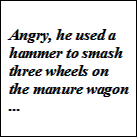 Our sponsors had another argument this morning.
Mary was helping John in the barn when the argument started. She said she would
never come in the barn again. John was mad all day. Angry, he used a hammer to
smash three wheels on the manure wagon and the chain we use to lift the wagon.
Now it's all useless.
Our sponsors had another argument this morning.
Mary was helping John in the barn when the argument started. She said she would
never come in the barn again. John was mad all day. Angry, he used a hammer to
smash three wheels on the manure wagon and the chain we use to lift the wagon.
Now it's all useless.
In the evening, I wrote to the
university in Madison. They had advertised a free correspondence course in
veterinary science. I was excited about this and hoped I could help myself and
others with this knowledge.
April 14, 1950
I worked all day to make a wheelbarrow
to replace the manure wagon..
At 10 a.m., Frank came to slaughter the
pig. In two hours, the pig was beheaded and cleaned. The pig had grown almost
100 lbs. in 45 days, eating nothing but corn. He weighed almost 300 lbs.
It was a beautiful spring day.
April 15, 1950
In the morning, I took care of Johnny
while Cilka helped to cut up the pig. In the afternoon, I split wood till I got
too hot.
In the morning we ate blood sausage,
then pig roast for lunch and supper.
April 16, 1950
At 8:10 we all went to church. Johnny
stayed in the back with me and slept. After Mass, Malci Jeras took us to
Karl's. In the afternoon, we went with Karl to a 100 foot high observation
tower. From the top of the tower we could see for 20 miles all around. The
observer in the tower showed us his instruments, binoculars and map. By chance
I embarrassed the observer by noticing some smoke before he did. He determined
the location, called a nearby farm and learned that it was a grass fire.
April 17, 1950
Hot. My right eye hurts.
I told John that Americans don't
understand the value of manure: they let it dry out, or they let it run down to
the creek. I suggested that we build a manure pit behind the barn and cover it
with small logs. "Oh, that's not worth it," he replied. "That's
done by people who have no money for fertilizer. Besides, don't you see that
the cows don't eat the grass that grows on the manure?"
In the afternoon we went into the
woods. We were not able to cut up a large aspen. We tired ourselves out using a
dull saw and axe. If I had had a file, I would have tried to sharpen them, but
I didn't.
In the forest, I noticed a coffin-like
shape, about 30 feet long and covered with moss. I uncovered the moss at one
end and found a pine trunk with red healthy wood inside. Not far away, there
were visible remnants of a narrow track railroad. John told me that it used to
be the railroad used by Swedes to transport freshly cut lumber from the pine
forest.
Cilka cleaned the garden today. John
sold a 118 lb. calf for $28. They say that it's not worth it to raise cattle,
so they feed the calves artificial feed for two or three weeks and sell them.
April 18, 1950
My entire head hurts from the pains in
my right eye. Uncle John and Aunt Mary are arguing about taking me to the
doctor. Aunt thinks I should go, but Uncle doesn't believe it's anything
serious - it doesn't look bad! We stayed at home and worked on the harness.
April 19, 1950
I did not make it to the barn this
morning - the first time since we arrived. My eye was hurting too much. Later
in the morning, John finally agreed to drive me to Greenwood, though Mary was
now opposed to my going. We finally left without her, still arguing. Dr. Olson
gave me medicine for an eye infection and charged 75 cents. John didn't offer
to help pay. He still thought the whole trip was not necessary.
In the evening John and Mary milked the cows themselves and did it faster than if I had been helping. It seems I'm not needed.
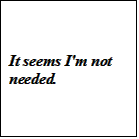 April 20, 1950
April 20, 1950
I stayed in bed till 6:30. Yesterday it
snowed, today the wind is howling. I'm washing my eye with warm water and boric
acid every three hours and adding 5 drops of medicine. The eye is redder, but
my head doesn't hurt as much. Johnny wants to be with me all day; he falls
asleep quickly in my arms.
The Marshfield Clinic told us that
Cilka does not have uterine cancer.
April 22, 1950
This morning John drove us all to
Greenwood to see Dr. Olson. He examined us for insurance with KSKJ. Cilka and I
will get 20-year life insurance and health insurance covering $500 of surgical
and hospital costs for each of us for $5.50 a month. We will also sign up
Johnny for $30 worth of life insurance at a cost of 15 cents a month.
(Translator's note: They wanted to be sure there would be enough money for a
funeral in case one of us died; and they believed in KSKJ, a Slovenian
fraternal organization.)
We need insurance, but how can I afford
it? Earlier, John had said that a "new person" should work for his
sponsor without pay for a year. I agree, but then the sponsor should cover what
the person needs during that year - not just room and board, but health needs,
too. It hit me hard that he was not even willing to pay 75 cents for a doctor
visit.
April 23, 1950, Sunday
Lamovec's visited us in the afternoon.
The others played cards - I played with Johnny, since I don't know how to even
shuffle the cards.
April 24, 1950
John and I picked up rocks in the
fields today. John had warned me about this work all winter: "It's nice
now, when there's no work! It'll be different when we go pick up rocks."
John led the horses today while I ran behind and brought rocks to the wagon.
Soon after we started, John asked, "What are you doing?" "I'm
picking up rocks." "I don't see anything - if it's not at least 4
inches wide, leave it alone!" When we came to a larger boulder, he didn't
want to help me. Mary had warned me about this and advised me to not pick up
larger rocks by myself. Instead of helping me, he preferred to lift the boulder
by himself, saying, "This is nothing."
I received a letter from my brother
John in Slovenia. He's feeling hopeless about his illness: he's having heart
problems. Even so, he wants to help me.
April 25, 1950
My friend Frank Kokelj in Canada wrote
and sent me $5. He promised he'll send me $100 or $200. Yesterday sad news,
today happy.
In the afternoon we cut down about 15
aspen trees in the woods. It started to snow.
April 26, 1950
The snow turned everything white. It
blew in the wind and felt like needles hitting my cheeks.
In the afternoon I rebelled for the
first time - I refused to go in the woods with John. I told him I'm not earning
enough to pay for the doctor. He knew the doctor had told me to stay out of the
wind. He said, "You can find yourself a different job!" "Yes,
I'll have to." "Your eye isn't the reason you don't want to
work." "My health comes first!" "Then I'll go by
myself" said John, ending the argument. He soon came back and asked if I
wanted to clean the pigsty and the chicken coop. I said, "Yes, anything
except go out in the wind." If I had refused that, too, he would probably
have thrown me out. He went to cut wood, I went to clean the pigsty by myself,
and then did the chicken coop with Mary. When he returned at four, he was
friendlier, but I didn't want to talk. My eye is again hurting more.
April 27, 1950
At breakfast, "Uncle" John
asked, "We didn't fall out yesterday, did we?" Then we talked openly
for a long time, sometimes quite sharply. Cilka said John had told her we
should go if we're not happy. John chided her, saying she was lying. "As
far as I'm concerned, you can stay here one, two or five years, if you
want," he said. He also said he would pay for my insurance. He promised to
pay me $50 for April, even though I had not worked much in the fields. I said I
would like to work more, but I'd rather rest if I'm always doing everything
wrong. Every day he wants things done differently so I can never satisfy him.
He said he's not "petty", like Mary says. I said Mary's right.
Later I wrote to Karl and asked him to
find work and housing for me; I asked the mailman to get the letter to Karl
right away.
April 28, 1950
I slept very poorly because of a headache. In the morning, I asked John to take me to the doctor. He agreed, reluctantly. Dr. Olson looked at my eye for a long time and finally found an infected abscess with a white spot on the inside of my eyelid. He lanced the white spot to drain the pus. It was very painful. Again, he only charged 75 cents. John finally believed that my eye really hurt.
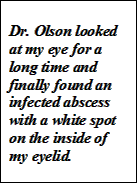 At home I put warm cloths soaked in sage on my
eye for 15 minutes every hour. John wouldn't leave me alone, so I went to work
in the barn even though the doctor had told me to stop working for a while.
At home I put warm cloths soaked in sage on my
eye for 15 minutes every hour. John wouldn't leave me alone, so I went to work
in the barn even though the doctor had told me to stop working for a while.
April 29, 1950
I'm back to a regular work schedule.
Helen came and advised me to always tell Mary if things are not going right.
April 30, 1950
Karl invited me to come live with him
and his family. A month ago, the farmer that had been allowing Karl to live in
a chicken coop told him he would have to move because the farmer wanted to use
the chicken coop for chickens again. Karl fortunately found much better housing
with Anton Debevec and his family. Karl said Mr. Debevec would take us in as
well. But Cilka said we should stay until we get the main work done in the
spring.
In the afternoon I got a .22 rifle from
Stamcar.
May 1, 1950
A beautiful morning, but then a cloudy
day. I worked in the barn without a bandage on my eye. I split wood and cleaned
the barn and yard all day. I received a letter from Silvia Hoja in California
and from James Debevec, who sent a check for $105.95 from Frank Kokelj in
Canada. After lunch, John offered $75 ($25 for March and $50 for April), which
I used to pay the hospital bill for Cilka, and $15 towards the train fare. Now
I still owe John $35 and I owe Rev. Wolfe $50 for the train fare.
I received a response from the
University of Wisconsin to my letter regarding the veterinary course. It seems
they only want to sell books.
In the afternoon John and I tried out
the rifle. I hit the target well at 7, 10 and 20 meters. John did poorly.
May 2, 1950
Cilka and Johnny rode with Mary and
Helen to Neillsville to buy 150 chicks.
May 3, 1950
Warm, rain in the afternoon. The rifle
is turning out to be a good way to get rid of the sparrows that have been
causing problems in the barn.
In the evening, I thought I heard
nightingales singing in the ditches along the road. Curious, I went to
investigate and find out what kind of nightingales they were. When I approached
the singers, they jumped into the ditch one by one. I realized they were frogs.
Twenty years ago, I was in the Jugoslav army in Bosnia. When I had night watch
duty, I heard real nightingales that sounded just like these frogs.
Other things sound different in
America, too. American ravens bark like Slovenian dogs, and the dogs here yelp
"wow, wow", not "hov, hov" like the dogs back home. The
train here roars like a bull, or rings a bell when it's shuffling cars in the
station.
Jernej Zupan sent me $17 for the lace I
sent him. He writes that it's hard to find housing in Cleveland.
May 4, 1950
John and I planted five apple trees and
two grape vines. When I asked him if we would follow the planting instructions,
he said "I've planted more trees than the fellow who wrote the
instructions." After some more arguing, he said "I'm not saying
you're wrong, but we're going to plant my way." His planting and pruning
methods are awful!
In the afternoon John's son-in-law
Frank came with his tractor to run the harrow in the fields. He invited me on
the tractor and taught me how to run it.
May 5, 1950
The wind was howling all day. It
knocked over the meat drying rack and almost knocked over the incubator for the
chickens. It's impossible to work in this weather.
May 6, 1950
It was quieter and cooler today. I fixed the wind damage, including the fence around the yard. John didn't believe me that 17 fenceposts were rotten.
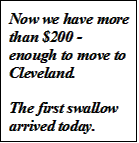 My brother-in-law Mire wrote from Canada and
sent $60. Now we have more than $200 - enough to move to Cleveland.
My brother-in-law Mire wrote from Canada and
sent $60. Now we have more than $200 - enough to move to Cleveland.
The first swallow arrived today.
May 7, 1950, Sunday
At 8 we all went to church. After Mass
we went to a meeting in the church hall. I paid my first monthly insurance
premium - exactly $3.
May 8, 1950
Frank worked in the fields with the
tractor, John with the horses. Frank got stuck in the lowest part of the field.
John used his horses to pull the tractor out of the mud.
May 9, 1950
There was a heavy rain and thunder at
night. Water is standing in the fields. John and I pounded in a large post near
the entrance to the yard.
May 10, 1950
I finally finished splitting all the
firewood.
John is 67 years old today. For
breakfast we had sausage, eggs and coffee. For lunch we had soup, chicken,
potatoes, cake, pie, coffee and dandelions. For supper we had rice, coffee and
pie. Lamovec's visited in the evening.
On this day, the farmers usually let
the cows out to pasture, but this year spring is almost a month late. There is
no grass yet.
May 14, 1950
Karl Erznoznik is leaving for Cleveland
next Wednesday. We can have his housing, his work and his furniture.
Back in the refugee camp, I promised my
friends I would write to them about being a farmer in America. I never did.
They knew that meant I didn't like it. I wonder if Karl will write from
Cleveland.
May 15, 1950
Frank worked with the tractor, planting
oats in the field behind the garage. The garage used to be the house where John
and Mary lived with two cows and a pig.
May 16, 1950
Again we picked up two wagonloads of
rocks from the fields. Cilka helped, too. They usually took the rocks to a pile
in the pasture. Now, at my suggestion, we used the rocks to fill the holes and
ruts in the path.
Erznoznik's came to say good-bye and
leave for Cleveland.
May 18, 1950
In the morning John and I picked up a
wagonload of rocks. In the afternoon Cilka and Helen's children, Judy and
Jerry, helped us pick up two wagonloads. John was constantly teaching us
"Don't be too 'petty'". We had to leave a lot of rocks in the fields.
May 20, 1950
John asked me if we should let the cows
out to pasture. "There is no grass," I said. He said "But we're
already 10 days late. What do you think, should we let the heifers (the one
year-old cows) out, too?" I replied, "I have no experience, do
whatever you think is right." So he let all the cows out. The heifers
became wild and broke out through the barbed wire fence. For a while, they ran
around in the meadow, but when they got tired, they returned to the herd, just
the way young people do. (Human heifers sometimes return from the wilderness
with scratched backs from the barbed wire of life.)
Then the older cows led the younger
ones down the road to the pasture. They remembered the way from last year and
were very disciplined. The heifers stayed close to the biggest Holstein cow.
May 21, 1950, Sunday
John took us on a Sunday drive. He showed
us a big round structure, like a tent, with a roof but no walls. The inside was
fenced off and full of cattle. They moved around freely and ate hay from the
pile in the middle of the structure whenever they wanted. John said
"That's the barn of a learned man." The owner was a teacher.
The next curiosity was a small, almost
new house in the middle of nowhere. There was no path to it, no garden around
it, nothing. John explained that this house was built hundreds of yards away.
On a hot day, a tornado rushed by, lifted the house from its base and
transferred it via air to its new location, undamaged.
May 24, 1950
In the morning Frank plowed a field for
corn. John used the horses to smooth the field, while I turned the furrows. At
3 o'clock we rested; it was too hot.
John and Aunt suggested that Cilka
could plant her own beans to make some money.
May 26, 1950
I'm anxiously waiting for Karl's
letter. He promised he would tell me about his new job and housing in
Cleveland.
When I was home alone this afternoon,
two young men came to our house. One of them said, "We will cut off the
cows' horns." I told them that John wasn't home, but they said they had
talked to him. They went directly to the barn, bound two heifers with ropes and
led them out. In the farmyard, one heifer became wild, but one of the men
pulled the ropes tighter around her snout and between her hind and front legs.
When the animal fell down, the other man sawed off her horns. It happened in
seconds. When they had finished with the other heifer, the men led them back
into the stable. The wounds were bleeding profusely. For a couple days after,
those heifers lost their appetite, but when their wounds healed, they started
to eat and drink again. I decided I was glad I wasn't taking the veterinarian
correspondence course.
May 28, 1950, Sunday
Today was Pentecost, a very important
holiday in Slovenia. In the morning John went down to the pasture to check on
the heifers. He noticed that they had left through the barbed wire and across
the creek which forms the boundary between our farm and the neighbor's. It was
time to go to church, so we couldn't look for the heifers right away. After we
returned from church, we went back to the pasture and found that the heifers
had returned to the herd by themselves. So John said, "Since we don't have
to do anything with the heifers, let's go to the field to pick up rocks."
I replied, "Today on such a holiday? Back home we celebrated not only
Pentecost Sunday, but the Monday after as well." But he said, "This
needs to be done today, tomorrow we'll have something else." So I worked
on Pentecost Sunday for the first time in my life.
May 29, 1950
Karl's letter finally arrived. He
writes that this is the best time to get work in Cleveland. If I'm going to
come, I should come immediately.
In the afternoon I worked with Frank
and asked him what he thought about my leaving the farm. "If you don't
help yourself, nobody will," he said.
In the evening I walked to where Sršen
was living. He wasn't there, but his family agreed that we should all leave
together next Wednesday. At 9:30 I returned home and told Mary we would be
leaving.
May 30, 1950
It's Decoration Day (Memorial Day), but
we're not observing it. There's too much work to do.
John promised to drive our belongings to Greenwood tomorrow, even if it takes 5 trips. I packed all morning and then helped load "junk" in the afternoon.
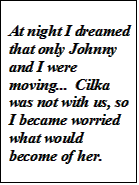 At night I dreamed that only Johnny and I were
moving. I dreamed I was carrying him through a swamp, and I saw a church with
two steeples in the distance. (Later, after we moved, I realized that the
church in my dream looked a lot like St. Vitus Church in Cleveland.) Cilka was
not with us, so I became worried what would become of her.
At night I dreamed that only Johnny and I were
moving. I dreamed I was carrying him through a swamp, and I saw a church with
two steeples in the distance. (Later, after we moved, I realized that the
church in my dream looked a lot like St. Vitus Church in Cleveland.) Cilka was
not with us, so I became worried what would become of her.
May 31, 1950
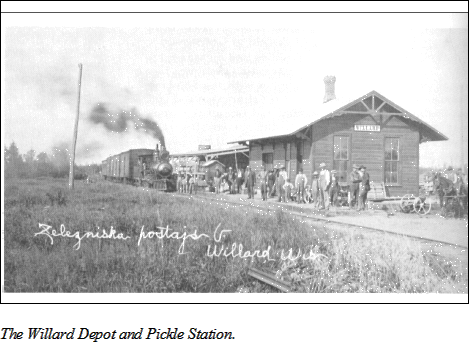 When I was milking the cows, John started
telling me how to do it, as he usually did. Mary said that wasn't necessary,
since we were leaving. A heated argument followed, worse than the one three
months ago. Mary threatened to leave him.
When I was milking the cows, John started
telling me how to do it, as he usually did. Mary said that wasn't necessary,
since we were leaving. A heated argument followed, worse than the one three
months ago. Mary threatened to leave him.
At 9 o'clock we took 2 crates and one
bag to Greenwood. We left the crates at the train station (478 lbs.). These are
the same crates that I built in the refugee camp in Austria. We used them to
pack all our belongings, including the pots and pans that we made out of downed
warplanes in Austria.
Cilka has been feeling sick, so we took
her to the doctor. He said her bleeding was not dangerous, gave her 12 brown
pills for three days, and said we could go to Cleveland. But if the bleeding
doesn't improve, she'll need to go to the hospital. I wrote to Karl and told
him we would come in three days.
In the afternoon, John and I pounded 9
fenceposts around the garden. In the evening I pruned the linden tree. Cilka is
in bed, not feeling any better.
June 1, 1950
John tried to convince me that it would
be better if we stayed. When I refused, he went looking for another hired man,
but he came back drunk. Frank disced the field for corn and started planting in
the afternoon; but the planter crushed the seed instead of planting it. John
smelled of alcohol like never before.
Cilka is bleeding more. Mary prepared
some food for our trip to Cleveland, but it looks like we're not going. Johnny
was so upset tonight, we didn't get to sleep till midnight.
June 2, 1950
Cilka just isn't getting any better.
Helen talked with the doctor by phone. At 9 a.m., Helen drove Cilka to the
doctor. When they didn't return at noon, we knew they had gone to the hospital
in Marshfield. That means we can't go to Cleveland.
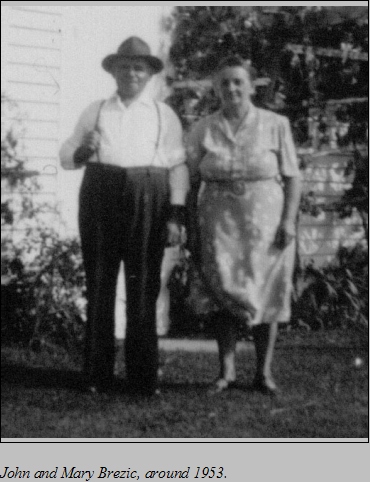 John is drinking. Mary cried again this morning.
Mary asked Helen and me, what should she do? Should she leave John for a while
or forever? She can't live with him alone.
John is drinking. Mary cried again this morning.
Mary asked Helen and me, what should she do? Should she leave John for a while
or forever? She can't live with him alone.
John promised to buy me a tractor and
pay me $50 a month even during the winter. I decided to leave even if he gives
me the whole farm. It was a hard decision, but after I made it, I was not
willing to reconsider. John said we can stay here weeks, months or years. He
suggested I demand that the packages I had sent to Cleveland be returned. I asked
him if there was enough income from the farm to support two families. He told
me exactly what he paid for fertilizer, seed, taxes, etc.; but he didn't say
anything about income. He proposed we run the farm 50:50.
John told me that, if he sold me the
farm, he would still retain the right to manage it. I said I would be thankful
for his advice, but quietly to myself, I was thinking that, if I owned the
farm, the final decisions would be mine.
Earlier, I had sought advice from a
highly respected person about buying the farm. He told me the Brezic farm was
far too small to support two families. I did consider it very seriously, but I
always came to the same conclusion - the annual income would hardly cover
necessities, with nothing left for savings. The longer I waited to move, the
worse it would be. With every passing year, I would be less able to move and
obtain work in a factory or a mine. Meanwhile, people are starving back home in
Slovenia and expecting me to send help. Even so, my father still has his sense
of humor - he wrote to me recently, "If you see a bag of flour lying by
the road, pick it up and send it to us. But you don't need to send us a yacht
until you have one yourself."
It rained this morning. I cleaned our
room upstairs. John drove with Johnny to Willard. He was drunk, but I knew he
would be offended if I didn't let him.
In the afternoon I sawed firewood and
sharpened the ends of logs to use as fenceposts.
Helen returned from Marshfield at 5 p.m. Cilka had another operation. It was successful, but she's weak and has lost a lot of blood. I'm worried about her and feel that I'm partly to blame.
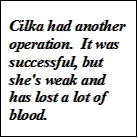 June 3, 1950
June 3, 1950
John is sick. Frank came to plant corn.
June 4, 1950
Helen and I went to Marshfield to get
Cilka. I paid $20 (reduced from $24.60) for two days in the hospital.
June 5, 1950
I cleaned the barn all day, then helped
John slaughter a 5-week old calf for veal.
June 6, 1950, Tuesday
Worked in the barn all day again. Mrs.
Rihtar came to tell me that her husband bought a house in Cleveland. We decided
that, if Cilka will be feeling strong enough to travel, we'll leave for
Cleveland next Monday. "Uncle" John and "Aunt" Mary want us
to stay at least till June 20, to participate in a silver wedding in Sheboygan.
June 7, 1950
John and I both cleaned the barn today.
We used strong water pressure to wash all the walls and floor, then a knife to
scratch off every little black spot on the walls.
The cows are out in the pasture night
and day, regardless of the weather. In the morning, we just have to whistle and
the cows come in to be milked. Each cow has to leave the barn as soon as it's
milked. If a cow craps in the barn, it gets whacked on the back. We cleaned the
silo, the drains and other areas with a broom and a wire brush. Although I like
cleanliness, it all seems overdone to me. When it became clear to me that we
were really not cleaning for cleanliness, that John was really just harassing me,
I told him he would make a good sergeant in the Jugoslavian army.
I had read about people with double
personalities, but I didn't believe they really existed. Now I believe that
John is such a person. Sometimes he's a good man and very cordial, but in the
next moment, he seems to enjoy harassing people. I often think about him and I
have come to the conclusion that he became embittered because his wife didn't
give him the son that he so dearly wanted.
Mici Erznoznik wrote from Cleveland
that we'll be able to live in Rihtar's house. She wants us to bring the kids'
wagon.
June 8, 1950
It's hot. In the morning, John and I
rode on the horse-drawn wagon to get ten small trees from the woods to make a
grape trellis. John sat in front and held the horses' reins. Helen's daughter
Judy sat next to him and I was in back. As we rode along, the back wheel of the
wagon struck a sapling, bending it forward. In an instant, the sapling snapped
in two; one part hit John on the back of his head and threw him off the wagon.
Blood started streaming from his head. When Judy saw the blood, she jumped from
the wagon and ran back home. John stared at me with an icy glare, as if saying
"For God's sake, don't kill me!" He was convinced I had hit him on
the head from behind with a fencepost. He must have realized from the look on
my face that he was mistaken. He quietly let me wipe the blood from his face.
We rode back home, where they already knew that we had had a fight and that I
had hurt him. How would I have proved my innocence if the sapling had killed
him? 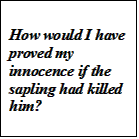
John rested that afternoon, while I
continued to work on the fenceposts.
June 9, 1950
There was a heavy rain with thunder
last night. In the morning we cleaned the barn again. It seems like a lot of
unnecessary work, but John says it has to be done to prepare for whitewashing.
Debevec brought the kids' wagon for
Mici.
June 10, 1950
I cleaned the barn again. Since I
couldn't get anything right, I argued with John and then left. He didn't ask me
to do anything else, so I looked for something myself. After these kinds of
situations, he usually says, in English, "I appreciate that you yourself
know what is to be done." But he's so mad when I don't obey him that he
can't even eat. In the afternoon, John and I worked together again.
June 11, 1950, Sunday
At 8:30 a.m., we went to Mass and the
Corpus Christi procession. We knew this might be our last service in this
church, so it was very sad.
In the afternoon, the others went
fishing at 1 o'clock, Johnny and I went at 3. We had planned this trip for some
time. "Aunt" Mary prepared herself thoroughly: she put on pants,
covered her head with a straw hat, and brought fishing gear and a picnic basket.
We caught 28 small fish. Mary ate most of them herself. We caught them in the
creek at the end of the pasture. The boundary with the neighbor's land runs
along the creek; a fence made of barbed wire runs down the middle of the creek.
Willard is known as a paradise for
hunters. All kinds of wildlife are plentiful. A hunter can shoot 10 rabbits a
day and one deer, regardless of its age or gender. The deer cause a lot of
damage to the crops. There are three kinds of rabbits here: small ones, bigger
ones like we had in Slovenia, and "snowrabbits." The snowrabbits are
completely white except that when you see them jumping in the snow, you can see
some black under the tail. There are wolves here, too. I saw one that had been
killed by a deer hunter. It wasn't wolf season yet, so the hunter buried it in
the snow and presented it to the authorities for a reward a few days later.
June 12, 1950
I woke at 5:15 and went to the pasture
to get the cows. I got done milking by 7. Then John drove me to the house where
the Rihtars have been living to help them pack. At 9:30 I walked back. John
asked me to help him fix the horses' stable (everything was old and broke
frequently), but I needed to get things ready for our departure.
We had lunch at 11:30. Then Helen came
to pick us up. We left with her at 12:15. It was hard to leave the farm. It had
been my first hope for independence. It was especially hard to leave
"Aunt" Mary, who had initially greeted us with dissatisfaction and
distrust, but had then tried everything she could to ease our fate. I know that
things will now again be worse for her, but I can't help her. Frank had said,
"Help your own self." He knew what it was like to work with John.
Riding with us were "Aunt"
Mary, Judy and Jerry. Mici and her mother joined us at Artac's. Then we drove
through Willard, Woodland and Merillan. After waiting an hour, we got our train
tickets.
Back on the farm, John had asked me how much he owed me for 10 days work in June. He gave me a check for $17. At the train station, I gave that to Helen for driving us there, but she gave me $12 back.
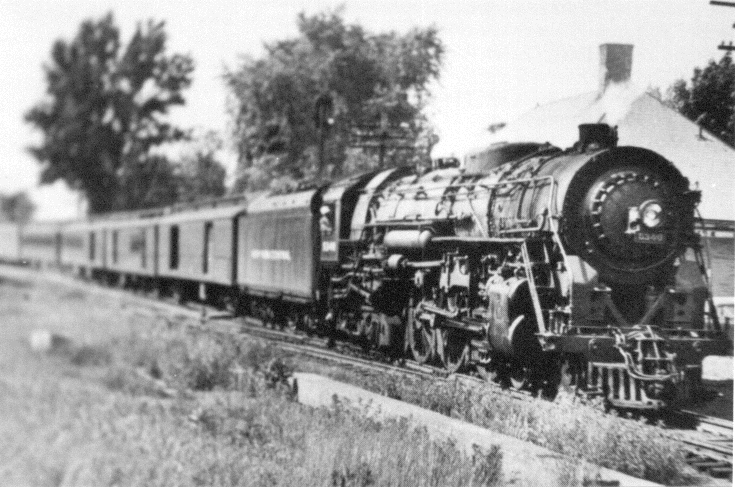 We
all weighed ourselves at the train station: Cilka weighed 156 lbs., Johnny 34
and me 147.
We
all weighed ourselves at the train station: Cilka weighed 156 lbs., Johnny 34
and me 147.
Mary and Helen had tears in their eyes.
Helen gave me a birthday present. The present included an undershirt, pants and
socks. I thanked them with the words "We owe you the most." We
boarded the train and left at 2:31.
We reached Milwaukee at 4 p.m. and saw
many factories and many Negroes. At 7 we reached the Soo Line station in Chicago,
then took a cab to the New York Central station. At 11 p.m., we left for Cleveland.
June 13, 1950
It's my 43rd birthday. I slept well on
the train. We reached Cleveland at 7 a.m. Mr. Rihtar was waiting for us at the
station. We took a taxi to his house at 990 East 63rd St. I gave the driver $4
for all six of us.
Rihtar's house is close to a horribly
noisy factory. It cost $6,000, including a washing machine and a refrigerator.
He borrowed the money from a storekeeper, Sušnik, whom he had known from the
old country.
Our "apartment" is in the attic. It consists of two rooms with overlaid wooden boards on the walls. It doesn't have water or a bathroom and, since it hasn't been cleaned for a long time, is hopelessly dusty. Mr. Rihtar promised to install a water pipe; for the time being, we'll carry it from downstairs. We'll use their bathroom and their refrigerator. Someone gave us an old gas stove, though there is no gas pipe. We'll use our shipping crate for a dining table. Someone also gave us part of an old bed. The only entrance to our apartment is from the kitchen below. The entire apartment has two light bulbs. We need water and gas, so we can do our own cooking.
In the afternoon I washed the walls and
the floor: everything was so black! Oh, Willard was much more beautiful! But at
least this apartment is better than the tent in Vetrinje (where we spent our
first nights as refugees.)
When we were in Wisconsin, Karl (who
had left before us) had agreed to write and tell us about Cleveland. Now I know
why he wrote so little: he didn't want to say anything bad, and didn't have
anything good to say. Here too, America is not the America we saw from Europe.
The Sršens, Zupans and Erznozniks
visited us today. In the evening we had supper with Ani Hudoklin, where the
Erznozniks are staying. They call her place the D.P. (displaced persons) hotel,
since Mr. Joe Grdina brings all the new refugees there if they have nowhere
else to stay.
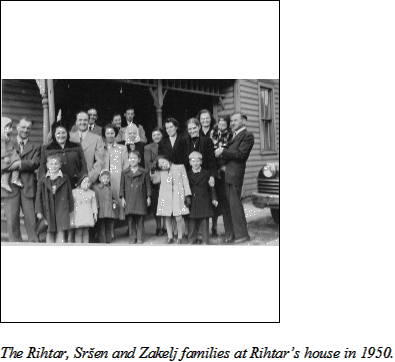
After a good supper,
Cilka and I had two glasses of beer. My dark disposition began to fade away.
Translator's closing note:
For the next three years, the Rihtar family shared their small house with us. During those three years, my mother had two more sons, Tony and Joe. My father got a job in a factory at $1 an hour. He saved half of what he earned. In three years, he saved enough for a down payment on two houses. Ten years after my parents fled their homes in Slovenia, they finally had a home of their own.
A few years after we left, Mr. and Mrs.
Brezic sold their farm and moved into Greenwood. John died in 1962, but Mary
lived into her 90's. Before she died, my mother and father traveled to Slovenia
with her, to visit the "old country."
Zakelj Diary
Home Page: http://bbhhs96.dyndns.org/~zakeljdiary/